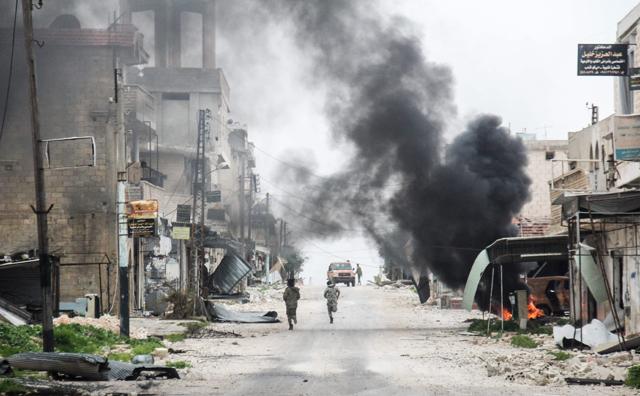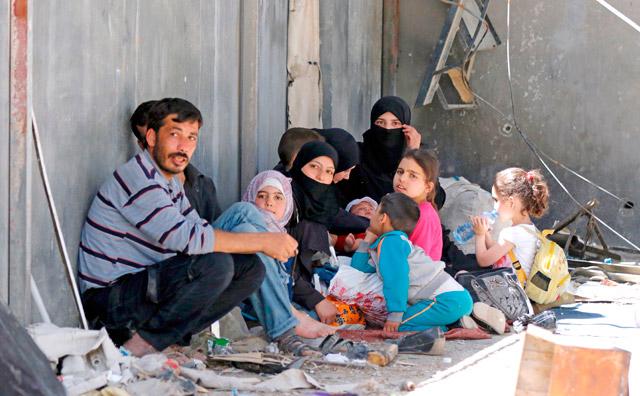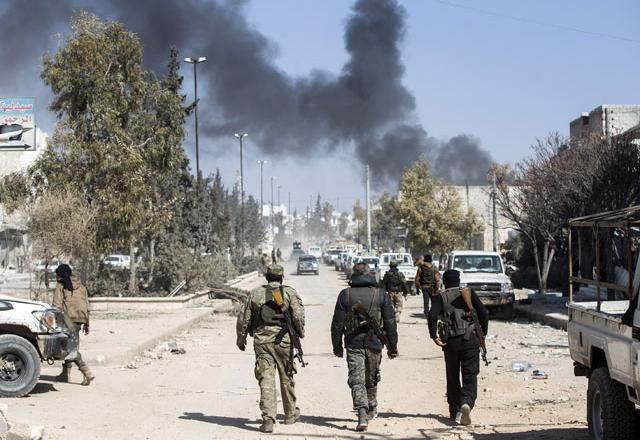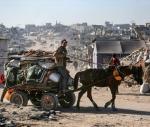You are here
UN’s troubled Syria peace talks restart in Geneva
By AFP - Mar 23,2017 - Last updated at Mar 23,2017

A photo taken on Wednesday in the Syrian town of Tayyibat Al Imam in the countryside of the central province of Aleppo shows fighters running amdist destruction down a street past a rising plume of smoke from a burning tyre meant to disrupt warplanes (AFP photo)
GENEVA — UN-backed Syria peace talks resumed in Geneva on Thursday, with little hope of a breakthrough and the emboldened regime seen as unlikely to make concessions.
UN Deputy Special Envoy Ramzy Ezzeldin Ramzy met separately with government negotiators and the main opposition High Negotiations Committee (HNC) at hotels in the Swiss city.
“We have started today preliminary talks,” Ramzy told reporters after his meeting with Syrian President Bashar Assad’s representatives.
“We hope we will be starting substantive discussions tomorrow.”
Ramzy’s boss, UN mediator Staffan de Mistura, was wrapping up a diplomatic tour of the key powers shaping the conflict, which included trips to Moscow, Riyadh and Ankara.
De Mistura is due back in Geneva on Thursday evening to take charge of the negotiations which have yielded little in four previous rounds.
A stalemate persists over most of the toughest issues, notably Assad’s fate, with the opposition insisting he quit power and the government declaring the president’s future off limits for discussion.
HNC Delegation Chief Nasr Al Hariri told reporters after meeting Ramzy that his camp was in Geneva to “guarantee the departure of Bashar Al Assad and his clique”.
The UN is aiming for a political deal to end a six-year conflict that has killed more than 320,000 people and displaced millions since it started in 2011 with protests against Assad’s regime.
On the agenda for this round is governance — a political transition, the constitution and elections — as well as counter-terrorism at the request of Damascus.
De Mistura tried to strike an optimistic note when the previous round ended last month, insisting that “everything is ready” for the talks to move forward while reiterating his view that there is no military solution to Syria’s devastating civil war.
‘Waste of time’?
But analysts disagree with the UN envoy, putting the chances of compromise at an all-time low, due in part the regime’s increasingly strong position on the ground.
“My assessment is that there will not be a formal political settlement at all,” Yezid Sayigh, a senior fellow at Carnegie Middle East Centre, told AFP.
“Regime advances make this almost a certainty,” he added.
Since Russia’s military intervention in support of Assad in 2015, the regime has gained the upper hand, retaking the former rebel bastion of Aleppo late last year.
For Syria specialist Thomas Pierret, as “the regime continues to gain ground... there’s no reason for it to make the slightest concession”.
But HNC spokesman Salem Al Meslet told journalists late on Wednesday that he hoped this round would “see real talks, not only a waste of time”.
Fresh fighting
An already-fragile ceasefire has deteriorated further in recent days after rebels and allied extremists launched two surprise offensives on government positions in Damascus and central Hama province.
Assad’s air force has responded with raids on rebel targets.
The pro-government Al Watan newspaper quoted an unnamed government negotiator as saying that the Damascus and Hama violence “make it clear and without any doubt that these groups and the countries who operate them want to... undermine any chance of finding a solution”.
Hariri described the escalation of violence around Damascus as “self-defence”.
So far, there is no plan for the government and rebels to meet face-to-face.
De Mistura has said he wants to unify the HNC with two smaller opposition camps — known as the Moscow and Cairo platforms — before presenting the government with a single rebel delegation.
Ramzy was scheduled to meet the Moscow and Cairo groups later on Thursday, but uniting them with the HNC could be tough due to disagreements over core issues, including Assad’s future.
“We still insist on direct negotiations,” Meslet told reporters.
Related Articles
GENEVA — Rival Syrian delegations on Wednesday weighed a UN proposal on developing a new constitution for the war-ravaged country, as a new
GENEVA — Russia has called on Syrian President Bashar Al Assad to stop his bombing campaign while peace talks take place this week, but a po
RIYADH — A meeting between Syrian opposition groups in Riyadh has ended in stalemate, a member said Tuesday, with the fate of President Bash















